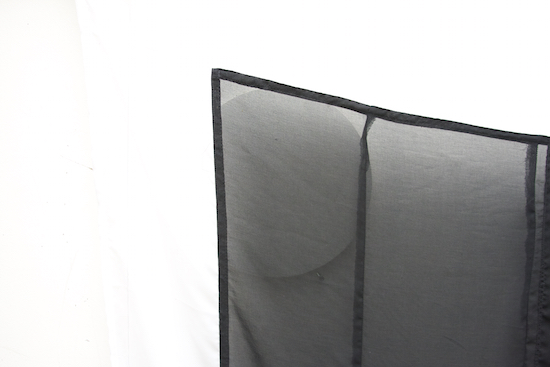From artwork by Dillwyn Smith photographed by Ian Mann
Next month, the ICA will be reanimating MusICA, their new music night that previously ran from the 1970s until the 90s, for a one-off event celebrating the work of the 20th-century Italian composer Giacinto Scelsi. MusICA Now: Exploring Sound and Authorship has been curated by film score composer Adrian Corker and Will Dutta, and features an excellent line-up: there’ll be ‘Notes From The Forest Floor’, an installation by Chris Watson, drawing on the nocturnal insect vibrations that mass up around the Hornbill Boardwalk pathway through the Sukau tropical rainforest in Sabah, Borneo, Via di San Teodoro 8, David Ryan’s part-experimental documentary, part-filmic poetic essay centred around Scelsi house in Rome and performances of Xnyobis by Aisha Orazbayeva, Duo for Violin and Cello by Orazbayeva and Lucy Railton and an improvisation for cello and oscillator by Railton and Corker.
This all comes in advance of an EP that those involved will be releasing. While it’s as-yet untitled, the tracks will be a recording of Orazbayeva and Railton performing Duo…‘s first and second movements, ‘Invertebrate Harmonics’ by Watson and ‘Honshirabe’, a traditional honkyoku piece, performed by Joe Browning and recorded by Watson. It’ll be out in September, with further release info coming later.
For full details, head to the ICA’s website here, while Corker has kindly allowed us to publish an essay he has written for the night’s programme, which you can read below.
—
Scelsi was a largely self-taught composer and Italian aristocrat whose career spanned the 20th century. Overlooked in his lifetime and deemed an ‘amateur’ by Pierre Boulez there is increasing awareness of his importance to a whole new generation of composers and musicians.
Scelsi once remarked: "Rome is the boundary between East and West. South of Rome, the East starts, north of Rome, the West starts. The borderline runs exactly through the Roman Forum. There is my house: this explains my life and my music."
Scelsi’s interest in Eastern philosophy and religion informed his compositional methods, breaking down the hierarchy of Western composer and performer and bringing improvisation and collaboration to the fore as a process in his writing. Maybe comparable to automatic writing, he perceived himself to be a conduit for the music rather than a traditional composer and would enter meditative states where he would improvise on a variety of instruments onto tape, overdubbing performances and then editing these performances into long-form structures. However, Scelsi also still was informed by the 20th-century avant garde, and these pieces were then painstakingly notated by others such as Vierri Tosatti into fiendishly difficult music for performance by soloists, duos, small ensembles and orchestras.
His methodology was echoed and acknowledged by Gruppo di Improvvisazione Nuova Consonanza (an important Italian improvisational group featuring film composer Ennio Morricone) who in turn were acknowledged by composers such as John Zorn, formative in the 1970s downtown New York scene. He was also a mentor to Alvin Curran. His use of the ondiola (an early electronic keyboard and also used by Joe Meek on ‘Telstar’) as one of his main improvisational tools also places him as a link in the development of electronic and electroacoustic music seen in the work of GRM studios in France amongst others. Ligeti was an admirer and his influence is also found in the Spectral school of music and composers such as Tristan Murail and Gérard Grisey.
Many electronic musicians such as Fennesz, Richard Skelton and Mica Levi now consciously or intuitively inhabit Scelsi’s world of sound and his compositional methods. Although new and controversial then, due to questions of authorship and his use of the ‘drone’ or ‘one-note’ music, his methodology has almost become a new orthodoxy amongst contemporary musicians, but one that continues to create fertile ground for experimentation and new forms.


